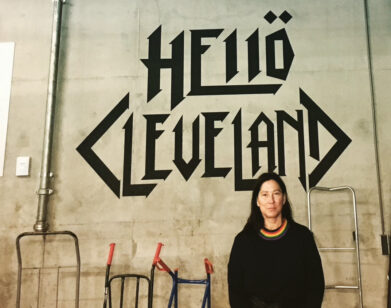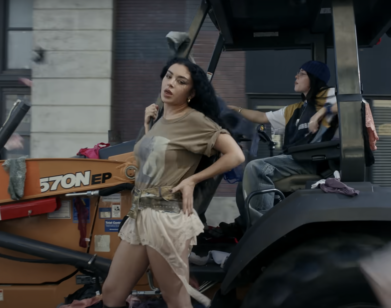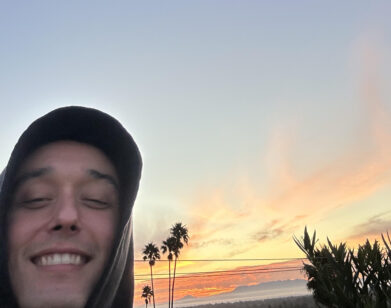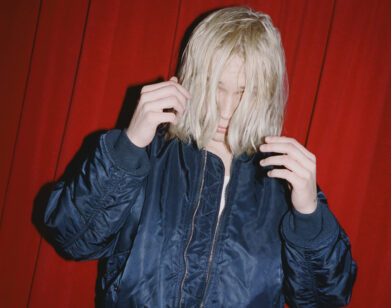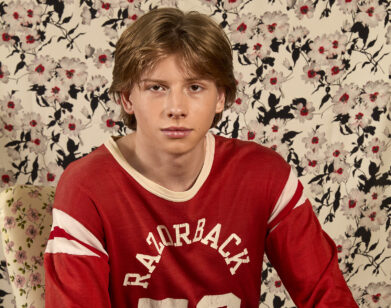The Cosmic Journey of Akron/Family
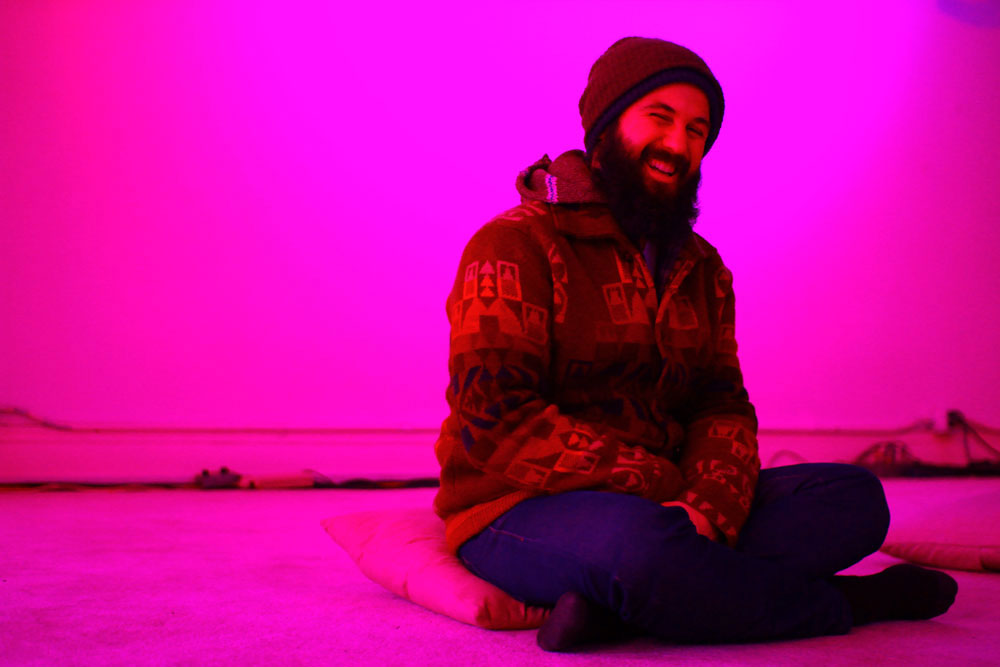
MILES SEATON. PHOTOS COURTESY OF BENJAMIN STELLY
Akron/Family have been circulating for nine years, and fans following their journey often have strong opinions about the albums they love and hate, and the band’s restless, indeterminate direction. They recently released Akron/Family 2 The Cosmic Birth and Journey of Shinju TNT, and we caught up with band member Miles Seaton. He took us to the Dream House in Tribeca, one of his favorite places in New York, and then sat down with us to talk about the release of several different versions of their recent album, reports that they recorded it on the side of a mountain, and the samples from a D’Angelo song that appear on Shinju TNT.
KRISTINA BENNS: I asked you to take me to one of your favorite places in New York; why did you choose the Dream House?
MILES SEATON: I feel like it represents a feeling I love about New York… It’s a really beautiful piece of art, and it’s something that’s accessible. The first time I went, I totally had my mind blown. Being in New York, and being totally unable to slow down, always being really busy. But there, it’s totally its own environment. I really feel like when I’m there, I’m not anywhere else.
MILES SEATON AT THE DREAM HOUSE, TRIBECA.
BENNS: When you’re making music, is there an aspect in the creation that’s not really aural? Do you have some physical, visual or mental angle that you bring to it?
SEATON: Ideally, it’s everything—I could probably talk for an hour about this. I don’t feel like I’m personally very adept when it comes to music. I can express myself musically, but I feel like conceptually and in a performance is when I’m in my right place. When it comes to how we produce records, there’s always a tension to the physical aspect of the sound. With this record in particular, we made a real decision to not take the mix from digital, because we wanted to maintain this almost unpleasant harmonic resonance that occurs with digital music. We wanted to have this almost in-the-teeth kind of quality.
The reality is that there are a lot of people that make great music for generations, so at a certain point, we have to try to expand our parameters. We have to consider all the aspects of what expression is. It is intellectual, but it also has a lot to do with intention, heart, where that music and that sonic expression comes from.
One classic example for me is with jazz. If you look at John Coltrane, he’s this radical expresser. Just brilliant. Then he meets Albert Ayler, and Ayler is just on fire. John Coltrane is like, “I’ve been practicing this and devoted to this instrument my whole life, and here I see Ayler, and he’s free.” So what I’m looking for when I’m making music is that energy. It doesn’t have to be just like Albert Ayler, fierce and on fire all the time, but it’s that vulnerability. Just expressing it on that broad, basic, primal level. When you can connect the two and travel back and forth is when you’re really winning.
BENNS: So what’s your new album called?
SEATON: Akron/Family 2 The Cosmic Birth and Journey of Shinju TNT—it’s actually S/T 2. Our first record was called Akron/Family and everyone abbreviated it to S/T. So we thought it was kind of funny.
BENNS: What’s the meaning behind that?
SEATON: I feel like this record was one of the first in a long time that that we actually sat down and wrote out goals and principles and made giant road maps and came up with all these ways of how we were going to communicate the vision of what we wanted to make. We had this really radical experience playing in Japan. The audiences were incredible and generous and totally willing to lose it with us.
Later, when we were on tour in Europe and talking about all this stuff we wanted to do in the band; making charts, showing each other crazy pictures, improvising. There was a point where we were completely tired and we had just drank a bunch of caffeine and we were like, “Oh my God, we need to come up with a name for this organic experience to be born, like this giant cosmic baby!” It was a ridiculous conversation. I think Dana Janssen was like “Shinju TNT, that’s the baby’s name!” And we went and found a sheet somewhere and bought all this spray paint and came up with this whole song about “Happy Birthday Shinju TNT” and spraypainted it all over the sheet and did this retarded performance of it live at the show that night. Who knows if it was successful? Of course we cared if we connected with people, but there was also this total earnest expression.
BENNS: I read crazy stories about how the track listing the band sent the record company was written in crayon, how you guys recorded on the side of a mountain. What was going on there? Is this media hype?
SEATON: Yes. Yes to everything. It’s all true. I guess what I can say is there’s a sacred responsibility that I feel as an artist. I feel like stories are magical and fantastic, and at the same time they’re absolutely true. Even when I tried to tell you the exact story of titling the album, it sounded like a joke. But it’s powerful. It’s physical and emotional. There’s no way to talk about that. What’s the point of trying to come up with the raw real fact of what everything looked like and get the perfect picture? To bolster nihilism in people’s minds? I don’t participate in that.
BENNS: I heard a few different versions of the album circulating, was that a conscious decision?
SEATON: We’re working hard to try to express something in a very limited format, so we’re trying to find ways to work within, against that, and without that. We have a lot of stuff going on that we’re working to express, and not all of it is going to make it on to one 48-minute record. These other versions sound almost more true to the intention of the process. But the reality is, that’s what’s cool, nobody pays for music anyway. Ideally, it’s nice that people can put their money towards something, that there’s a cool object exchange. But the great thing about digital consumption is you can just put something out there and say it is what it is.
BENNS: Your band is nine years old—how are you staying connected in that relationship?
SEATON: With this new album, we’re finding a way to achieve that kind of intimacy that drew people in to us initially. Our early records had a lot of vulnerability and chances. Then we got really involved in a more electric, loud, psychedelic direction. For this record, we felt like there was a mood we all related to, we were trying to reference, and we did. We found all our old hard drives, and sampled all these old things from different songs, like the snaps we sampled originally from a D’angelo song: “Get the D’Angelo snaps!” “Get that free jazz horn we manipulated!”
We try to glue the whole thing together. We always joke that after we make 15 records, it will be like, “Oh, right! This makes sense!” I remember reading the bass player from The Grateful Dead would play a bass line at the beginning of a show and end with that same bass line. I was always like, “That’s kind of like what I’m thinking!” [laughs]
AKRON/FAMILY PLAYS AT THE KNITTING FACTORY TONIGHT AND WILL CONTINUE TO TOUR THROUGHOUT THE SPRING. FOR MORE INFORMATION, VISIT THEIR WEBSITE.

